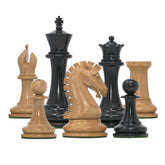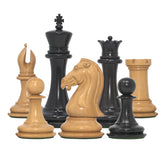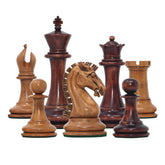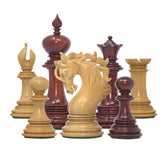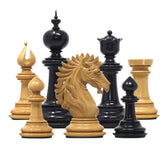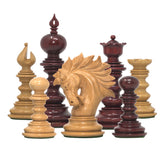Popular Products
Vendor:Staunton Castle
Commemorative Signature Series 3.625" Staunton Chessmen by MANDEEP SAGGU in Boxwood/Ebony
COMMEMORATIVE SIGNATURE SERIES 3.625" Chess Set BY MANDEEP SAGGU Staunton Castle announces another masterpiece - COMMEMORATIVE SIGNATURE SERIES BY MANDEEP SAGGU. A luxury Chess set!!! This Chess set is a combination of perfection and...
- $362.95
- $362.95
- Unit price
- / per
Vendor:Staunton Castle
Chariot of Selene Series 4.4" Luxury Staunton Chessmen in Ebony Wood
Chariot of Selene Series 4.4" Luxury Staunton Chessmen Extreme accuracy is a hallmark of authentic Mandeep Saggu historical reproductions, and this exacting set is clear proof. The finely detailed knights capture every dramatic feature of the solitary marble horse head The British Museum...
- $599.95
- $599.95
- Unit price
- / per
Vendor:Staunton Castle
Commemorative Signature Series 3.625" Staunton Chessmen in Distressed/ Mahogany Stained Boxwood
COMMEMORATIVE SIGNATURE SERIES 3.625" Chess Set BY MANDEEP SAGGU Staunton Castle announces another masterpiece - COMMEMORATIVE SIGNATURE SERIES BY MANDEEP SAGGU. A luxury Chess set!!! This Chess set is a combination of perfection and one can see the real craftsmanship on it. WE...
- $340.95
- $340.95
- Unit price
- / per
Vendor:Staunton Castle
Valluzia Series 4.4" Luxury Staunton Chessmen in Blood Rose Wood and Boxwood
Valluzia Series 4.4" Luxury Staunton Chessmen The renowned master...
- $599.95
- $599.95
- Unit price
- / per
Vendor:Staunton Castle
The Arthurian Series 4.4" Luxury Artisan Ebony Wood Chess Pieces
The Arthurian Series Luxury Artisan Chess Pieces A PERFECT HALLMARK OF STAUNTON CASTLE Staunton Castle is pleased to announce its luxurious masterpiece - The Arthurian Series Luxury Artisan Chessmen from our exclusive Mandeep Saggu Signature Collection. This series is the combination of elegance...
- $574.95
- $574.95
- Unit price
- / per
Vendor:Staunton Castle
Raging Stallions Series Luxury Staunton Blood Rosewood Chessmen - 4.4" King
Raging Stallions Series 4.4" Luxury Staunton Chessmen The magnificence of Mandeep Saggu designs and his unsurpassed handcrafted perfection are clearly evident in this masterful set. From regal styling and exquisite crests to the extraordinary, deeply carved details of its spectacular knights, Raging Stallions stands...
- $641.95
- $641.95
- Unit price
- / per
History Of Chess
History Of Chess
The history of chess can be traced back around 1500 years; started in the North of India and then spread throughout the Asian continent.
Chess is known all over the world, played by numerous fans, but its roots and origins are not clear and are highly debatable. There are a variety of legends, stories and plain guesses, starting from a dispute over where it came from and ending with when chess began.
However, most people can agree that there was not just one individual who invented the established game because it is far too complex with all its rules and concepts for any single simple human mind to have created.
Indian Origin theory:
One ancient legend that many children might even find in their maths books is about the tyrannical Indian king, Shihram, and a wise man in his kingdom. The wise man wanted to convince Shihram of the importance of each resident of his kingdom.
So, he invented a game to represent the kingdom consisting of the king himself, his queen, rooks, bishops, knights, and pawns, all of which were important.
The king liked the game very much and understood that the game was just like real life. So, he ordered everybody in his kingdom to play chess! Shihram offered the man all the gold and silver that he wanted, but the wise man didn’t want any treasure.
Together with the king, he went to a chess board and asked him to put one grain of wheat on the first square, two on the second and to keep doubling it until the chessboard was full.
First of all, the king felt highly offended, but then he ordered his servants to fulfill the man’s wish. Desperately, the servants conveyed that such an enormous amount of wheat did not exist!
The king understood that the wise man had given him a second lesson. Just like the pawns in chess, you should never underestimate the small things in life!
This is one of the most popular legends about the history of chess. But for sure, there are many more…
China Origin Theory:
There are not only those who believe chess comes from India, but some people believe that chess was invented in China.
The legend says that chess was invented around 200 B.C. by a commander, Hán Xin, who invented the game to represent a particular battle.
Soon after the battle, an important battle in Chinese history, the game was forgotten and then resurfaced in the 7th century A.D. with several new rules.
The game became popular under the name “XiangQi” which means the “elephant game”, losing its reference to the ancient battle. The elephant game was very dissimilar to the chess game that we know today.
They had other pieces, another board, and even other rules. According to this belief, chess went from China to India and Persia afterward, where it slowly modified into the chess game we know today with an 8×8 square chessboard and the chess pieces that we are familiar with.
“A History of Chess” – By H.J.R. Murray in 1913
In his book, Murray assumes that the history of chess started in the North of India, traveled to Persia, and then spread throughout the Asian continent.
In the Eastern World, for example in India or Persia, chess became a part of the courtly education of the nobility.
In those days words like “Shāh!” – Persian for the king – or “Shāh Māt!” – the king is helpless – were used in the games.
These words are very similar to the terms we use today with “check” and “checkmate”. The rules were already quite similar to the chess rules we know nowadays.
Murray describes the original mold of chess, called Shatranj. Then he presents the role of medieval chess in Europe during the Middle Ages, how it traveled from the Middle East to Russia and then to Western Europe.
Finally, in the third part of his book on chess history, the author arrives at the beginning of modern chess in the 19th century as we know it today.
All in all, there are a variety of hypotheses about the history of chess and there is no specific person who invented this well-known game. It has changed throughout the centuries and will probably keep changing with the times.
The history of chess can be traced back around 1500 years; started in the North of India and then spread throughout the Asian continent.
Chess is known all over the world, played by numerous fans, but its roots and origins are not clear and are highly debatable. There are a variety of legends, stories and plain guesses, starting from a dispute over where it came from and ending with when chess began.
However, most people can agree that there was not just one individual who invented the established game because it is far too complex with all its rules and concepts for any single simple human mind to have created.
Indian Origin theory:
One ancient legend that many children might even find in their maths books is about the tyrannical Indian king, Shihram, and a wise man in his kingdom. The wise man wanted to convince Shihram of the importance of each resident of his kingdom.
So, he invented a game to represent the kingdom consisting of the king himself, his queen, rooks, bishops, knights, and pawns, all of which were important.
The king liked the game very much and understood that the game was just like real life. So, he ordered everybody in his kingdom to play chess! Shihram offered the man all the gold and silver that he wanted, but the wise man didn’t want any treasure.
Together with the king, he went to a chess board and asked him to put one grain of wheat on the first square, two on the second and to keep doubling it until the chessboard was full.
First of all, the king felt highly offended, but then he ordered his servants to fulfill the man’s wish. Desperately, the servants conveyed that such an enormous amount of wheat did not exist!
The king understood that the wise man had given him a second lesson. Just like the pawns in chess, you should never underestimate the small things in life!
This is one of the most popular legends about the history of chess. But for sure, there are many more…
China Origin Theory:
There are not only those who believe chess comes from India, but some people believe that chess was invented in China.
The legend says that chess was invented around 200 B.C. by a commander, Hán Xin, who invented the game to represent a particular battle.
Soon after the battle, an important battle in Chinese history, the game was forgotten and then resurfaced in the 7th century A.D. with several new rules.
The game became popular under the name “XiangQi” which means the “elephant game”, losing its reference to the ancient battle. The elephant game was very dissimilar to the chess game that we know today.
They had other pieces, another board, and even other rules. According to this belief, chess went from China to India and Persia afterward, where it slowly modified into the chess game we know today with an 8×8 square chessboard and the chess pieces that we are familiar with.
“A History of Chess” – By H.J.R. Murray in 1913
In his book, Murray assumes that the history of chess started in the North of India, traveled to Persia, and then spread throughout the Asian continent.
In the Eastern World, for example in India or Persia, chess became a part of the courtly education of the nobility.
In those days words like “Shāh!” – Persian for the king – or “Shāh Māt!” – the king is helpless – were used in the games.
These words are very similar to the terms we use today with “check” and “checkmate”. The rules were already quite similar to the chess rules we know nowadays.
Murray describes the original mold of chess, called Shatranj. Then he presents the role of medieval chess in Europe during the Middle Ages, how it traveled from the Middle East to Russia and then to Western Europe.
Finally, in the third part of his book on chess history, the author arrives at the beginning of modern chess in the 19th century as we know it today.
All in all, there are a variety of hypotheses about the history of chess and there is no specific person who invented this well-known game. It has changed throughout the centuries and will probably keep changing with the times.
- Choosing a selection results in a full page refresh.
